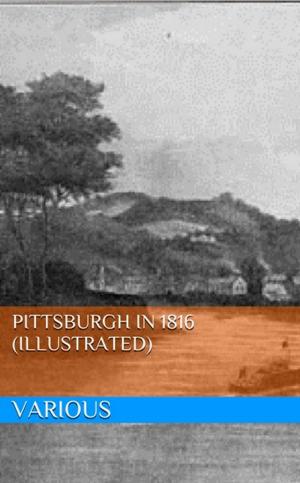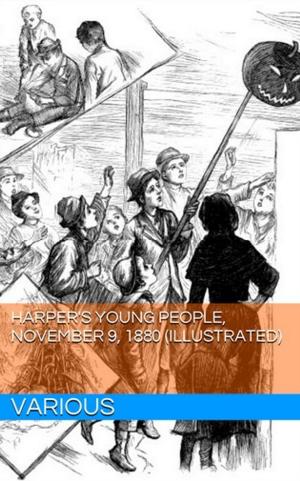| Author: | William Black | ISBN: | 1230000159760 |
| Publisher: | Lost Leaf Publications | Publication: | August 13, 2013 |
| Imprint: | Language: | English |
| Author: | William Black |
| ISBN: | 1230000159760 |
| Publisher: | Lost Leaf Publications |
| Publication: | August 13, 2013 |
| Imprint: | |
| Language: | English |
CONTENTS OF VOL. II.
CHAPTER I.
A FURTHER DISCOVERY
CHAPTER II.
CONFESSIONS
CHAPTER III.
HESITATIONS
CHAPTER IV.
'AMONG THE UNTRODDEN WAYS'
CHAPTER V.
A LESSON IN FLY-FISHING
CHAPTER VI.
POETA ... NON FIT
CHAPTER VII.
A LAST DAY ON THE LOCH
CHAPTER VIII.
THE PARTING
CHAPTER IX.
SOUTHWARDS
CHAPTER X.
GRAY DAYS
CHAPTER XI.
KATE
CHAPTER XII.
A SOCIAL EVENING
CHAPTER XIII.
INDUCEMENTS
CHAPTER XIV.
ENTANGLEMENTS
CHAPTER XV.
CAMPSIE GLEN
CHAPTER XVI.
THE DOWNWARD WAY
WHITE HEATHER.
CHAPTER I.
A FURTHER DISCOVERY.
It can hardly be wondered at that these suddenly presented ambitious projects—this call to be up and doing, and getting forward in the general race of the world—should add a new interest and fascination, in his eyes, to the society of the American father and daughter who had wandered into these distant wilds. And perhaps, after all, he had been merely wasting his time and throwing away his life? That solitary, contented, healthy and happy existence was a mistake—an idle dream—an anachronism, even? The common way of the world was right; and that, as he heard of it in the echoes brought by these strangers from without, was all a pushing and striving and making the most of opportunities, until the end was reached—independence and ease and wealth; the power of choosing this or that continent for a residence; the radiant happiness and glow of success. And then it all seemed so easy and practicable when he heard these two talking about their friends and the fortunes they had made; and it seemed still more easy—and a far more desirable and beautiful thing—when it was Miss Carry herself who was speaking, she seated alone in the stern of the boat, her eyes—that had a kind of surface darkness and softness, like blackberries wet with rain—helping out her speech, and betraying an open friendliness, and even conferring a charm on her descriptions of that far-off pork-producing city of the west. Mr. Hodson, as he sate upright in his easy-chair before the fire, spoke slowly and sententiously, and without any visible enthusiasm; Miss Carry, in the stern of the coble, her face all lit up with the blowing winds and the sunlight, talked with far greater vivacity, and was obviously deeply interested in the future of her companion. And it had come to this now, that, as she sate opposite him, he quite naturally and habitually regarded her eyes as supplementing her meaning; he no longer rather shrank from the directness of her look; he no longer wished that she would sit the other way, and attend to the tops of the salmon-rods. As for their speech together, the exceeding frankness of it and lack of conventionality arose from one or two causes, but no doubt partly from this—that during their various adventures on the loch there was no time for the observance of studied forms. It was 'Do this' and 'Do that,' on his part—sometimes with even a sharp word of monition; and with her it was 'Will that do, Ronald?' or again,—when she was standing up in fell encounter with her unseen enemy, both hands engaged with the rod—'Ronald, tie my cap down, or the wind will blow it away—No, no, the other strings—underneath!'
Indeed, on the morning after the evening on which they had been urging him to make a career for himself, there was not much chance of any calm discussion of that subject. The proceedings of the day opened in a remarkably lively manner. For one thing the wind had backed still farther during the night, and was now blowing briskly from the north, bringing with it from time to time smart snow showers that blackened the heavens and earth for a few minutes and then sped on, leaving the peaks and shoulders and even the lower spurs of the hills all a gleaming white in the wintry sunlight.
'Salmon-fishing in a snow-storm—well, I declare!' said she, as she stood on the shore of the lake, watching him putting the rods together.
'The very best time,' said he, in his positive way (for he had assumed a kind of authority over her, whereas with Meenie he was always reserved and distant and timidly gentle). 'None better. I would just like to find a foot of snow on the ground, right down to the edge of the loch; and the flakes falling so thick ye couldna see a dozen yards ahead of ye.'
'Do you know where I should be then?' she retorted. 'I should be warming my toes in front of Mrs. Murray's peat-fire.'
'Not one bit,' said he, just as positively. 'If ye heard the salmon were taking, ye'd be down here fast enough, I'm thinking.'
CONTENTS OF VOL. II.
CHAPTER I.
A FURTHER DISCOVERY
CHAPTER II.
CONFESSIONS
CHAPTER III.
HESITATIONS
CHAPTER IV.
'AMONG THE UNTRODDEN WAYS'
CHAPTER V.
A LESSON IN FLY-FISHING
CHAPTER VI.
POETA ... NON FIT
CHAPTER VII.
A LAST DAY ON THE LOCH
CHAPTER VIII.
THE PARTING
CHAPTER IX.
SOUTHWARDS
CHAPTER X.
GRAY DAYS
CHAPTER XI.
KATE
CHAPTER XII.
A SOCIAL EVENING
CHAPTER XIII.
INDUCEMENTS
CHAPTER XIV.
ENTANGLEMENTS
CHAPTER XV.
CAMPSIE GLEN
CHAPTER XVI.
THE DOWNWARD WAY
WHITE HEATHER.
CHAPTER I.
A FURTHER DISCOVERY.
It can hardly be wondered at that these suddenly presented ambitious projects—this call to be up and doing, and getting forward in the general race of the world—should add a new interest and fascination, in his eyes, to the society of the American father and daughter who had wandered into these distant wilds. And perhaps, after all, he had been merely wasting his time and throwing away his life? That solitary, contented, healthy and happy existence was a mistake—an idle dream—an anachronism, even? The common way of the world was right; and that, as he heard of it in the echoes brought by these strangers from without, was all a pushing and striving and making the most of opportunities, until the end was reached—independence and ease and wealth; the power of choosing this or that continent for a residence; the radiant happiness and glow of success. And then it all seemed so easy and practicable when he heard these two talking about their friends and the fortunes they had made; and it seemed still more easy—and a far more desirable and beautiful thing—when it was Miss Carry herself who was speaking, she seated alone in the stern of the boat, her eyes—that had a kind of surface darkness and softness, like blackberries wet with rain—helping out her speech, and betraying an open friendliness, and even conferring a charm on her descriptions of that far-off pork-producing city of the west. Mr. Hodson, as he sate upright in his easy-chair before the fire, spoke slowly and sententiously, and without any visible enthusiasm; Miss Carry, in the stern of the coble, her face all lit up with the blowing winds and the sunlight, talked with far greater vivacity, and was obviously deeply interested in the future of her companion. And it had come to this now, that, as she sate opposite him, he quite naturally and habitually regarded her eyes as supplementing her meaning; he no longer rather shrank from the directness of her look; he no longer wished that she would sit the other way, and attend to the tops of the salmon-rods. As for their speech together, the exceeding frankness of it and lack of conventionality arose from one or two causes, but no doubt partly from this—that during their various adventures on the loch there was no time for the observance of studied forms. It was 'Do this' and 'Do that,' on his part—sometimes with even a sharp word of monition; and with her it was 'Will that do, Ronald?' or again,—when she was standing up in fell encounter with her unseen enemy, both hands engaged with the rod—'Ronald, tie my cap down, or the wind will blow it away—No, no, the other strings—underneath!'
Indeed, on the morning after the evening on which they had been urging him to make a career for himself, there was not much chance of any calm discussion of that subject. The proceedings of the day opened in a remarkably lively manner. For one thing the wind had backed still farther during the night, and was now blowing briskly from the north, bringing with it from time to time smart snow showers that blackened the heavens and earth for a few minutes and then sped on, leaving the peaks and shoulders and even the lower spurs of the hills all a gleaming white in the wintry sunlight.
'Salmon-fishing in a snow-storm—well, I declare!' said she, as she stood on the shore of the lake, watching him putting the rods together.
'The very best time,' said he, in his positive way (for he had assumed a kind of authority over her, whereas with Meenie he was always reserved and distant and timidly gentle). 'None better. I would just like to find a foot of snow on the ground, right down to the edge of the loch; and the flakes falling so thick ye couldna see a dozen yards ahead of ye.'
'Do you know where I should be then?' she retorted. 'I should be warming my toes in front of Mrs. Murray's peat-fire.'
'Not one bit,' said he, just as positively. 'If ye heard the salmon were taking, ye'd be down here fast enough, I'm thinking.'















